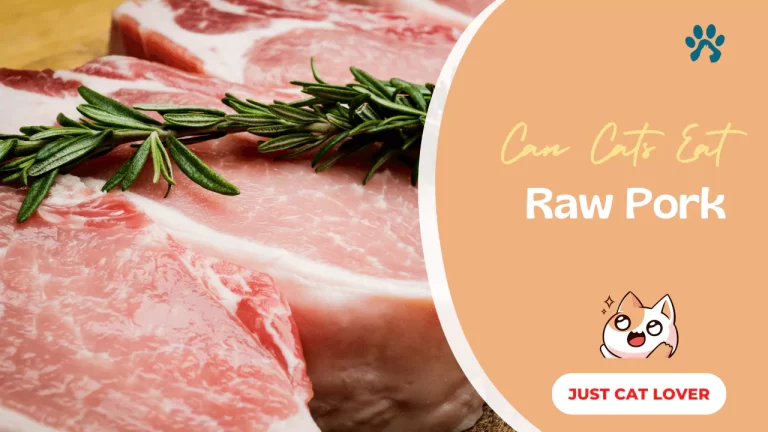No, cats should not eat raw pork due to the health risks. While pork can be a source of protein and nutrients for cats, raw pork may contain harmful bacteria that can cause foodborne illnesses.
Cooking pork thoroughly kills any dangerous pathogens present. There are safer meat options to feed cats raw if you want to try a raw diet.
Nutritional Value of Raw Pork
Raw pork contains protein, fat, vitamins, and minerals that may benefit cats. Pork is a complete protein source, meaning it contains all the essential amino acids cats need. The nutrient composition of raw pork includes:
- Protein – Around 20% of calories
- Fat – Around 34% of calories
- Vitamin B6, B12, niacin, zinc, iron, magnesium, potassium, phosphorus
So raw pork does have nutrients cats can utilize. However, any benefits are outweighed by the risks.
Health Risks of Eating Raw Pork
Eating raw or undercooked pork poses a few health hazards for cats:
- Bacterial infections – Raw pork may contain Salmonella, E. coli, Listeria, Clostridium, and other bacteria. These can cause gastrointestinal illness in cats.
- Parasites – Raw pork has a high risk of harbouring parasites like trichinella, taenia solium, and toxoplasma. These can transmit to cats and cause parasitic infections.
- Toxoplasmosis – Cats eating raw pork are at risk of toxoplasmosis, a parasitic disease that can cause flu-like symptoms. Toxoplasmosis is more dangerous during pregnancy since it can infect fetuses.
Overall, the pathogens in raw pork make it an unsafe choice for feline diets. Thorough cooking kills the bacteria and parasites.
Is Raw Pork Safe for Cats to Eat?
No, raw pork is not considered safe for cat consumption. The risks of food poisoning and parasitic infections outweigh any potential benefits. While pork can be part of a balanced homemade diet, it should always be thoroughly cooked first to at least 160°F throughout.
Some proponents of raw diets believe the nutrients in raw meat outweigh the risks. However, there are no demonstrated benefits of a raw meat diet compared to a cooked meat diet for cats. Safer alternatives exist.
Potential Benefits of Feeding Raw Pork to Cats
The potential benefits of raw pork for cats include:
- Highly digestible animal protein source
- Nutrient content of B vitamins, zinc, iron, magnesium
- Moisture content from raw meat
However, these benefits apply to cooked pork as well. And any perks are negated by the health risks of raw pork.
How to Safely Feed Raw Pork to Cats?
If you still wish to feed raw pork, follow these precautions:
- Choose fresh, high-quality pork from a reputable source
- Freeze raw pork for 3 weeks to kill parasites before feeding
- Thaw frozen pork in the refrigerator before feeding
- Wash hands and utensils that touch raw pork to prevent cross-contamination
- Closely monitor your cat for any symptoms of illness afterwards
Keep in mind that freezing and handling precautions only reduce the risk – they cannot eliminate it entirely. Cooking pork remains the safest option.
Alternatives to Feeding Raw Pork to Cats
Instead of raw pork, healthier raw meat choices for cats include:
- Raw chicken or turkey
- Raw beef or lamb
- Raw rabbit or game meats
Lean muscle meats contain the most beneficial nutrients for cats. Always freeze, thaw, and handle these meats properly to reduce pathogen risks.
For maximum safety, choose cooked meats instead of raw. Cook meat to a safe internal temperature and use cooked meats in homemade cat food recipes.
Symptoms of trichinosis in cats can include:
- Diarrhea
- Vomiting
- Fever
- Lethargy
- Muscle pain and stiffness
- Difficulty breathing if larvae migrate to lungs
- Enlarged lymph nodes
- Pale gums
Other raw meats cats can eat include:
- Chicken
- Turkey
- Beef
- Lamb
- Fish
- Rabbit
- Venison
Always freeze raw meats for at least 3 weeks and thaw in the refrigerator before feeding. Cooked meats are safer but raw meat diets may offer other benefits if prepared properly. Consult your vet for guidance.







